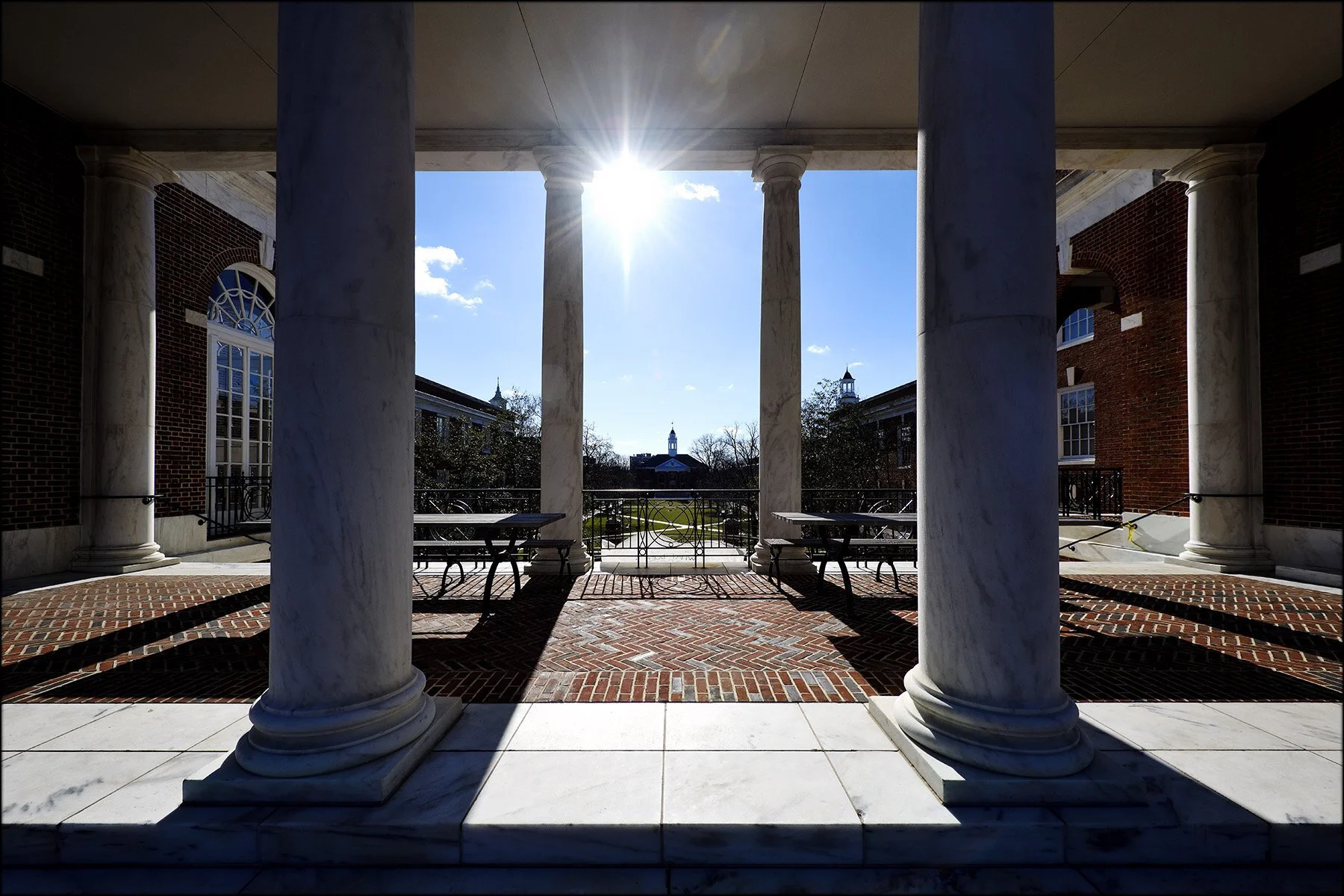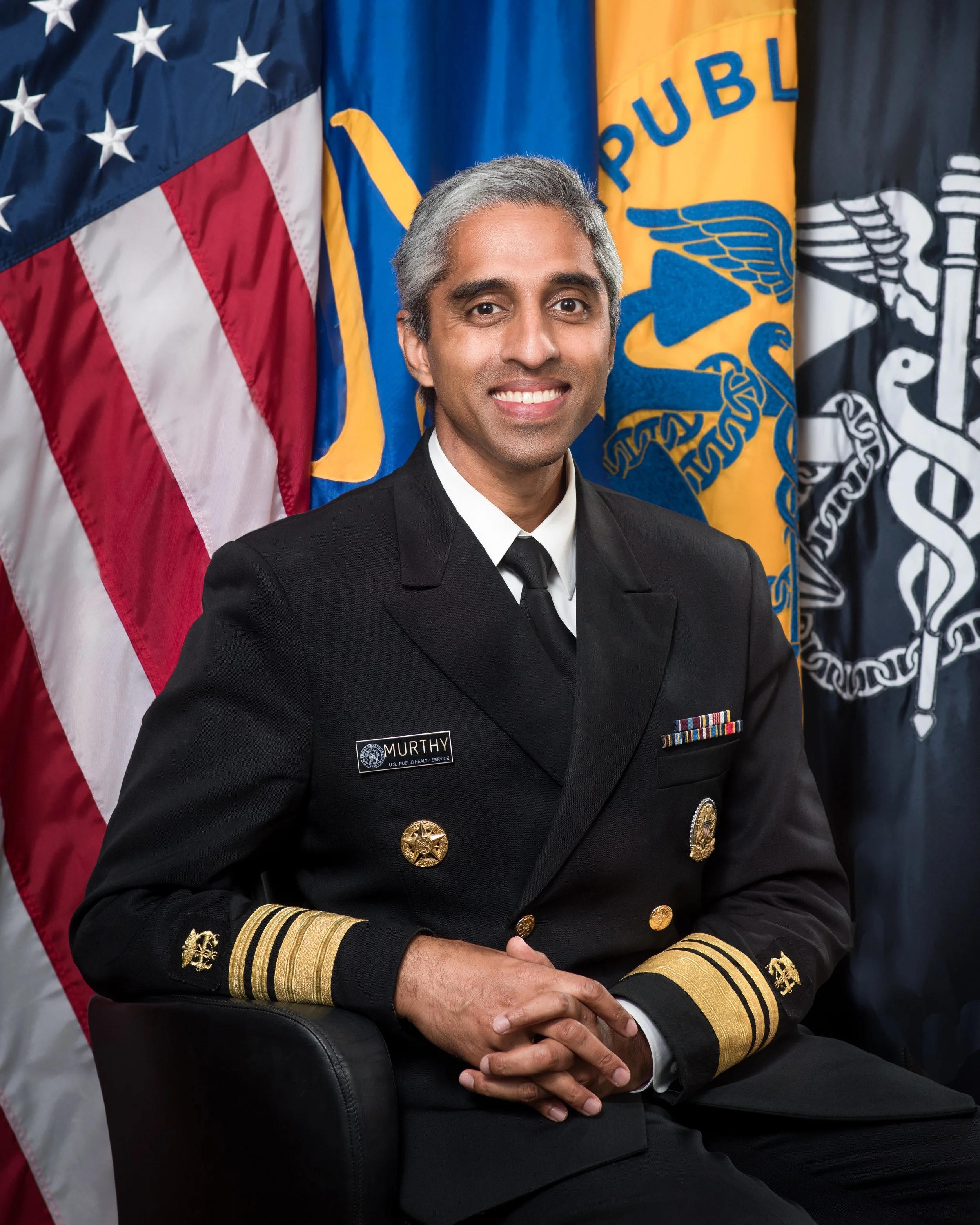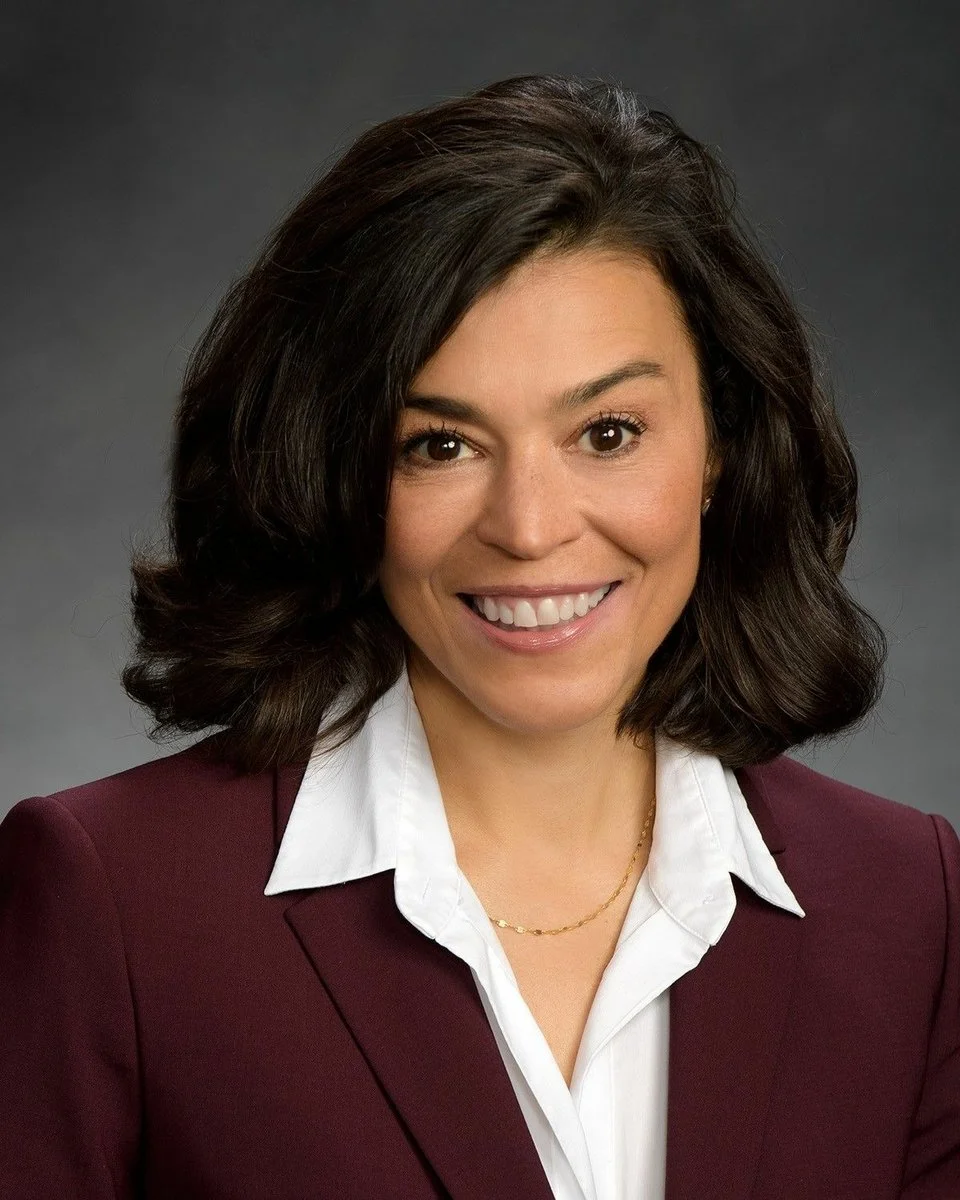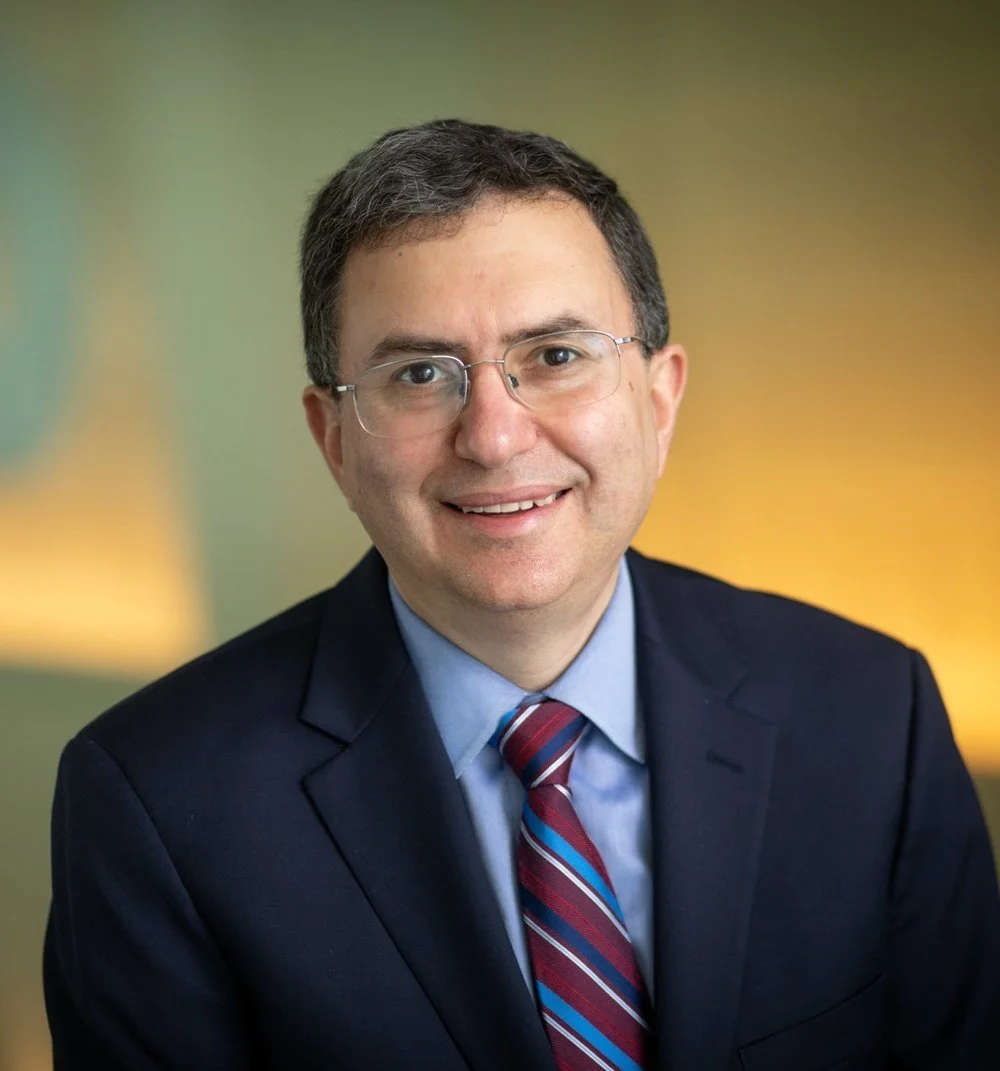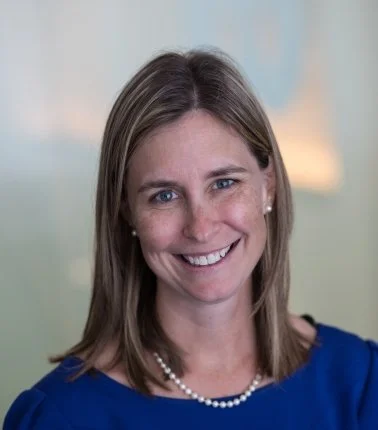Featured Speakers of The 2023 GHLC at JHU
Vivek Murthy, MD, MBA
19th and 21st Surgeon General of The United States of America
Vice Admiral Vivek H. Murthy was confirmed by the U.S. Senate in March 2021 to serve as the 21st Surgeon General of the United States. As the nation’s top doctor, Dr. Vivek Murthy helps to advance the health and well-being of all Americans and has worked to address critical public health issues. He has issued Surgeon General Advisories on the youth mental health crisis and social media’s impact on youth mental health, the epidemic of loneliness and isolation, and on burnout in the health worker community. Dr. Murthy also issued a Surgeon General’s Framework on mental health in the workplace and he is the first Surgeon General to host a podcast, House Calls with Dr. Vivek Murthy, where he invites guests and listeners to explore how we can all build more connected and meaningful lives.
As Vice Admiral of the U.S. Public Health Service Commissioned Corps, Dr. Murthy oversees more than 6,000 dedicated public health officers serving underserved and vulnerable populations.
Dr. Murthy previously served as the 19th Surgeon General under President Obama. Raised in Miami, Dr. Murthy received his bachelors degree from Harvard, his medical degree from the Yale School of Medicine, and his Masters in Business Administration from the Yale School of Management.
Sonia Angell, MD, MPH
Bloomberg Professor of the Practice of American Health in the Department of Epidemiology at the Johns Hopkins Bloomberg School of Public Health; Former Director of the California Department of Public Health; Former Deputy Commissioner of the New York City Department of Health and Mental Hygiene
Dr. Sonia Angell is a Bloomberg Professor of the Practice of American Health in the Department of Epidemiology, and provides leadership for the Bloomberg American Health Initiative’s work on food systems change. She is a physician and expert in public health, policy and systems change. She has over 15 years’ experience in government, from the local to global level, and remains current in the practice of primary care medicine.
Previously, she served as Director of the California Department of Public Health and State Public Health Officer, as Deputy Commissioner at the New York City Department of Health, as senior advisor on Global Noncommunicable Diseases at the U.S. Centers for Disease Control and Prevention, and she was the founding director of the Cardiovascular Disease Prevention and Control Program at the New York City Health Department.
Dr. Angell is board certified in internal medicine. She completed Internal Medicine residency at Brigham Women's Hospital and is a former Robert Wood Johnson Clinical Scholar. She was a Fellow of the second class of the Aspen Institute Health Innovators Program, and is an elected member of the National Academy of Medicine.
Thomas Quinn, MD, MSc
Founding Director of the Johns Hopkins Center for Global Health; NIH Distinguished Investigator; Associate Director of International Research at the National Institute of Allergy and Infectious Diseases (NIAID); Chief of the International HIV/STD Section in the NIAID Laboratory of Immunoregulation; Professor of Medicine and Pathology in the Johns Hopkins School of Medicine; Professor of Epidemiology, International Health, Molecular Microbiology and Immunology in The Johns Hopkins School of Public Health; Professor of Nursing in The Johns Hopkins School of Nursing
Dr. Thomas Quinn is professor of medicine and pathology in the Johns Hopkins School of Medicine and professor of international health, epidemiology, and molecular microbiology and immunology in The Johns Hopkins School of Public Health, and professor of nursing in the Johns Hopkins School of Nursing. In 2006 he was appointed founding Director of the Johns Hopkins University Center for Global Health. He serves as advisor/consultant on HIV and STDs to the World Health Organization, Office of the Global AIDS Coordinator (PEPFAR), UNAIDS, and the FDA.
He serves as Associate Director for International Research at the National Institute of Allergy and Infectious Diseases. He is a member of the Institute of Medicine of the National Academy of Sciences, and is a fellow of the American Association for the Advancement of Science. He is a fellow of the Infectious Diseases Society of America and a member of the American Association of Physicians. He is an author of over 900 publications on HIV, STDs, and infectious diseases, and serves on multiple editorial boards.
Among his professional activities, Dr. Quinn is an alternate member of the Technical Panel of the Global Fund to Fight AIDS, Malaria, and Tuberculosis and has been on Advisor/Consultant on HIV and STDs to the World Health Organization, UNAIDS, and the U.S. Food and Drug Administration. In October 2004 he received membership in the Institute of Medicine.
Natalia Linos, MSc, ScD
Executive Director of the François-Xavier Bagnoud (FXB) Center for Health and Human Rights at Harvard University
Dr. Natalia Linos is a social epidemiologist and the Executive Director of the FXB Center for Health and Human Rights at Harvard. She has over 15 years of experience working at the global and local levels on some of the most pressing public health challenges of our time: from climate change to systemic racism.
Since 2019, she has helped build a new research area for the FXB Center focused on racial justice. She co-leads the two largest programs in this area, namely to create an actionable field of scholarship on structural racism and health and make the public health case for reparations. These efforts build on their work together, including at the New York City Health Department and research on the social, legal and political determinants of health.
Prior to her role at Harvard, Dr. Linos worked at the United Nations for over a decade in diverse roles. From 2016 to 2019, she led UNDP’s work at the nexus of health, climate change and the environment. She is using that knowledge and experience to expand the FXB Center’s work and partnerships on environmental justice and climate action for health equity. From 2007 to 2014, she served as a policy specialist in Beirut, Lebanon, and later as an adviser and speech writer to former UNDP Administrator and Prime Minister of New Zealand Helen Clark, while also completing her doctoral studies.
In 2020 and in response to the COVID-19 pandemic, Dr. Linos ran for Congress to represent Massachusetts’ fourth Congressional district. She is currently a Town Meeting and School Committee Member in Brookline and on the town’s Advisory Council on Public Health. She also serves on the Board of the Environmental League of Massachusetts.
Natalia is a three-time Harvard University graduate, earning her Bachelor of Arts in Anthropology, Master of Science in Social Epidemiology, and Doctor of Science in Social Epidemiology. She also holds a Certificate in Forced Migration from Oxford University’s Refugee Studies Centre.
Kellogg J Schwab, PhD, MSPH
Abel Wolman Professor in Water and Public Health in the Department of Environmental Health and Engineering at the Johns Hopkins University Bloomberg School of Public Health; Director of the Johns Hopkins University Water Institute
Kellogg Schwab, PhD, integrates engineering, public health, and human behavior by researching water and wastewater contaminants of public health concern. He is the Abel Wolman Professor in Water and Public Health in the Department of Environmental Health and Engineering at the Johns Hopkins University Bloomberg School of Public Health and Director of the JHU Water Institute. The Water Institute integrates Hopkins researchers from public health, engineering, chemistry, materials science, medicine, behavior, policy, and economic disciplines to address the critical nexus of water, food, and energy. The goal of this program is to achieve sustainable, scalable solutions for domestic, agricultural, and industrial water challenges.
Dr. Schwab's research laboratory focuses on environmental microbiology and engineering with an emphasis on the fate and transport of chemicals, emerging contaminants and pathogenic microorganisms in water, food, and the environment. Current research projects involve investigating innovative water reuse treatment options as well as improving environmental detection methods for noroviruses (the leading cause of non-bacterial gastroenteritis worldwide). He is also working with Hopkins colleagues to integrate mobile data collection to assess family planning along with water, sanitation and hygiene around the world.
Dr. Schwab received his PhD and MSPH from the University of North Carolina, Chapel Hill.
JOSHUA SHARFSTEIN, MD
Vice Dean for Public Health Practice & Community Engagement and Professor of the Practice in Health Policy and Management at the Johns Hopkins Bloomberg School of Public Health; Former Principal Deputy Commissioner of the Food and Drug Administration (FDA); Director of the Bloomberg American Health Initiative; Former Secretary of the Maryland Department of Health and Mental Hygiene
Dr. Joshua Sharfstein works to develop and promote public health strategies, healthcare payment approaches, and regulatory policies that advance health and equity.
Early in his career, Dr. Sharfstein served as health policy advisor to Congressman Henry A. Waxman. Among the issues he worked on were HIV/AIDS, oversight of the Food and Drug Administration (FDA), tobacco, and public health.
After the election of President Barack Obama in 2008, Sharfstein served as leader of the Obama transition team on the FDA. In 2009, he was appointed by President Obama as Principal Deputy Commissioner of the FDA.
Dr. Sharfstein, whose early work in politics included work for Public Citizen’s Health Watch, has been a frequent critic of drug industry marketing practices—going all the way back to his days in medical training. During his time as public health commissioner of Baltimore, he led the effort to restrict the marketing of pediatric cold remedies.
Sharfstein has also written articles criticizing the American Medical Association for its pattern of giving campaign contributions to political candidates that take stands the majority of physicians oppose. One of those articles focused on AMA donations to candidates and elected officials who have fought the regulation of tobacco—a position the medical community generally favors and that Dr. Sharfstein has advocated over the years.
He has also come under the ire of anti-vaccine groups because, consistent with the advice of the American Academy of Pediatrics and the vast majority of medical professionals, he has been an ardent supporter of vaccines as an essential part of public health.
Dr. Sharfstein is an elected member of the National Academy of Medicine and the National Academy of Public Administration.
Megan Weil Latshaw, PhD, MHS
Associate Scientist at the Johns Hopkins Bloomberg School of Public Health; Director of the Master’s Degree Programs in the Department of Environmental Health & Engineering at the Johns Hopkins Bloomberg School of Public Health
Megan Latshaw, PhD, MHS serves as Director of the Master's degree programs in the Department of Environmental Health & Engineering, as core faculty for the Bloomberg American Health Initiative's Environmental Challenges focus area, and teaches at both the undergraduate and graduate levels. She also serves as Immediate Past Chair of the American Public Health Association's Intersectional Council.
Previously, Dr. Latshaw led the Environmental Health Programs in the Association of Public Health Laboratories. While there, her team created the National Biomonitoring Network, a foundation for a national environmental health surveillance system able to address concerns at the state and local level.
Prior to that, she served as the Senior Director for Environmental Health Policy at the Association of State and Territorial Health Officials. While there Dr. Latshaw led the establishment of the State Environmental Health Directors group.
Her doctorate is in Environmental and Occupational Health from the Johns Hopkins Bloomberg School of Public Health. Additionally, she holds a Masters in Environmental Health Sciences, a Certificate in Risk Sciences and Public Policy, and a Bachelors in Biology from the same University.
Dr. Latshaw has served on over a dozen national committees. She has authored eight peer-reviewed articles and presented at dozens of conferences and meetings.
Jerold Mande, MPH
Adjunct Professor of Nutrition at the Harvard T.H. Chan School of Public Health; Visiting Fellow of the Jonathan M. Tisch College of Civic Life, Tufts University; CEO of Nourish Science
Professor Mande has a wealth of expertise and experience in national public health and food policy. He served in senior policymaking positions for three presidents at USDA, FDA, and OSHA helping lead landmark public health initiatives. In 2009, he was appointed by President Obama as USDA Deputy Under Secretary for Food Safety. In 2011, he moved to USDA’s Food, Nutrition, and Consumer Services, where he spent six years working to improve the health outcomes of the nation’s $100 billion investment in 15 nutrition programs. During President Clinton’s administration, Mr. Mande was Senior Advisor to the FDA commissioner where he helped shape national policy on nutrition, food safety, and tobacco. He also served on the White House staff as a health policy advisor and as Deputy Assistant Secretary for Occupational Health at the Department of Labor. During the George H.W. Bush administration he led the design of the iconic Nutrition Facts label at FDA, for which he received the Presidential Design Award.
Mr. Mande began his career as a legislative assistant for Al Gore in the U.S. House and Senate, managing Gore’s health and environment agenda, and helping Gore write the nation’s organ donation and transplantation laws.
Mr. Mande earned a Master of Public Health from the University of North Carolina at Chapel Hill and a Bachelor of Science in nutritional sciences from the University of Connecticut. He also completed the senior government managers program at the Harvard Kennedy School of Government. Prior to his current academic appointments, he served on the faculty at the Tufts, Friedman School of Nutrition Science and Policy, and Yale School of Medicine.
Abby C King, PhD
David and Susan Heckerman Professor and Professor of Epidemiology & Population Health and of Medicine at the Stanford Prevention Research Center of Stanford University
Recipient of the Outstanding Scientific Contributions in Health Psychology Award from the American Psychological Association, Dr. King's research focuses on the development, evaluation, and translation of public health interventions to reduce chronic disease in the US and globally. Her current research focuses on expanding the reach and generalizability of evidence-based interventions through use of state-of-the-art communication technologies; community-based participatory research perspectives to address health disparities among disadvantaged populations; and policy-level approaches to health promotion.
She has served on a number of government taskforces in the U.S. and abroad, including membership on the U.S. Department of Health and Human Services’ Scientific Advisory Committee on National Health Promotion and Disease Prevention Objectives for 2020, and the Science Board of the U.S. President’s Council on Fitness, Sports and Nutrition. She co-Chaired the USDHHS 2018 Physical Activity Guidelines for Americans Advisory Committee. An elected member of the Academy of Behavioral Medicine Research and Past President of the Society of Behavioral Medicine (SBM), In 2014 she was one of 10 scientists who received honors from the Association of American Medical Colleges (AAMC) for outstanding research targeting health inequities. Among additional honors that she has received are the Society of Behavioral Medicine’s Distinguished Research Mentor Award, the International Society of Behavioral Nutrition and Physical Activity's inaugural lifetime achievement award in 2019, and the Society of Behavioral Medicine's 2020 Distinguished Scientist Award. She also has been honored with the 2020-21 Alva Myrdal Guest Professorship Award at Mälardalen University, Sweden. She has twice received the Stanford Prevention Research Center’s Outstanding Contributions to Teaching Award, and in 2022 was honored with Stanford University's Miriam Aaron Roland Prize for volunteer and public service, recognizing exemplary work to engage students in integrating scholarship and service.
In 2022, Dr. King was ranked among the inaugural list of “Best Female Scientists Worldwide” by Research.com. She is also founder and Faculty Director of the OUR VOICE Global Citizen Science Research Initiative and Network.
Yi-Chun (Philip) Lo, MD
Deputy Director-General of Taiwan Centers for Disease Control; Adjunct Infectious Disease Physician at National Taiwan University Hospital
Dr. Yi-Chun (Philip) Lo is currently Deputy Director-General of Taiwan Centers for Disease Control and adjunct infectious disease physician at National Taiwan University Hospital.
He received his M.D. from National Taiwan University College of Medicine in 2001 and then volunteered for two years at the Taiwan Medical Mission based in Mzuzu Central Hospital Malawi between 2001 and 2003. He then completed internal medicine residency and clinical infectious disease fellowship at National Taiwan University Hospital.
Since changing his main career path from clinical medicine to public health in 2008 and completing an Epidemic Intelligence Service fellowship at the US CDC in 2011, Dr. Lo has been dedicated to controlling the HIV epidemic, leading field investigations, as well as responding to emerging threats including H7N9, Ebola, MERS, Zika, Chikungunya and most recently COVID-19 in Taiwan. Dr. Lo is currently the Deputy Director of the Healthcare Response Team in the COVID-19 Central Epidemic Command Center in Taiwan.
Adam Seth Levine, PhD, MA
Stavros Niarchos Foundation Agora Institute Associate Professor of Health Policy and Management at the Johns Hopkins University Bloomberg School of Public Health
Dr. Levine is currently studying the role of science in American life, and in particular when scientists collaborate with civic and political leaders to address pressing public health, environmental, and other challenges. Dr. Levine has published many peer-reviewed papers in a variety of political science, transportation planning, climate change, communication, law, and economics journals. He regularly gives talks on civic engagement to a wide variety of audiences, including researchers, practitioners, policymakers, students, and grant-makers.
He is also the president and co-founder of research4impact, a nonprofit organization that connects researchers, practitioners, and policymakers with similar interests. Thus far he has helped create 300 new collaborations.
Dr. Levine’s research informs, and is informed by, his teaching. At Johns Hopkins he teaches a variety of courses both at the undergraduate and graduate level on the links between science, democracy, and health.
Dr. Levine recieved his PhD and MA from the University of Michigan and his undergraduate degree from Cornell University.

